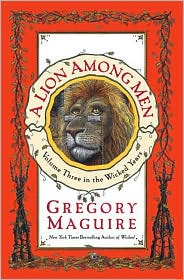"The last thing she ever cared about was gossip. Yet she had been out of touch for so long that she was astonished at the vigorous opinions of these random nobodies."
We were all crazy about Elphaba when we read the novel for a book group 10 years ago. Yet I didn't keep up with the Wicked books. Perhaps the idea of the musical put me off (even though it confirmed my good taste).
But for Christmas I received A Lion among Men, the third book in the Wicked series, an excellent novel for reading at night. Maguire has cleverly transformed Brr, the Cowardly Lion, into a displaced animal who earns a reputation for heroism when an act of cowardice is misinterpreted d during a political demonstration (dwarfs vs. humans).

Eventually we learn that he was probably concocted in a lab: he fits in nowhere and perhaps is the loneliest animal in the world. Talking animals have been driven out of the cities, and he has lived among humans too long. He is accepted neither by prides of lions nor by human beings during his adventures, and survives by working or, eventually, selling services for different political factions.
I enjoyed this novel, but it isn’t in the same class (a classic) as Wicked.
Son of a Witch, the second Wicked book, which I began today, is closer to Wicked in the complexity of the plot and smoothness of the writing.
No comments:
Post a Comment